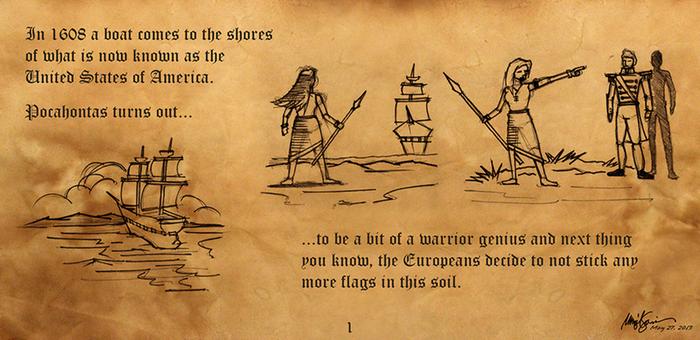




Well I'm not about to wipe out any native cultures so I have no idea why you are telling me this?Mt.goat wrote:
Warren,I agree but also disagree on some counts.I`m all for bringing in new plants and technique but also for looking closely at the cultures that came before and how they survived and I have found native plants to be quite reliable in my area so ...more tools in the tool box.Now where I have more problems is with the `cultural needs`crowd.`needs` are often subjective and many native cultures have been wiped out by european culture(being often incompatible)in the name of `needs`.Now if I asked someone if they needed dairy so much,would they be willing to kill someone?They would probably say no but in a convoluted way thats what happened.Settlers thought they needed dairy so than they needed domestic animals which they needed to protect.The natives who had no concept of private ownership would poach the animals and would than be needed to be killed.Thats what happened in CA with sheep hearders.




There is nothing permanent in a culture dependent on such temporaries as civilization.
www.feralfarmagroforestry.com




Mt.goat wrote:
Just pointing out how peoples Ideas of what their bodies need is often rooted in psychology that cultural needs have been the manifesto of manifest destiny.Did the colonisers actually try living native?or did they just impose their ideas of land management over an already functioning and well established food system.Now that the traditional food models are destroyed,there is no longer a need for destroying them.












urbanpolyculture wrote:
Toby Hemenway points toward that moment in human history between hunter / gathering and agriculture referring to it as horticulture.
Idle dreamer








Our inability to change everything should not stop us from changing what we can.




So what exactly do you disagree with? (without going into a ramble about native cultures)Mt.goat wrote:
Warren,I agree but also disagree on some counts.




Why are you pointing that out to me? I don't really care what the colonizers did. It's like we are having two different conversations.Mt.goat wrote:
Just pointing out how peoples Ideas of what their bodies need is often rooted in psychology that cultural needs have been the manifesto of manifest destiny.Did the colonisers actually try living native?or did they just impose their ideas of land management over an already functioning and well established food system.Now that the traditional food models are destroyed,there is no longer a need for destroying them.
 All I'm saying is that people should be eating for health. I know what foods I thrive on and what foods I don't. I let that be my guide when it comes to food choices.
All I'm saying is that people should be eating for health. I know what foods I thrive on and what foods I don't. I let that be my guide when it comes to food choices. 




Idle dreamer




Robert Ray wrote:
Not to make light of the topic I'm wondering when does one become indigenous? How many generations does it take?
I'm a small portion American Indian so where does the rest of my past ethnic mix fit in? Do I have a place?
http://davetroy.com/posts/becoming-indigenous
Idle dreamer




There is nothing permanent in a culture dependent on such temporaries as civilization.
www.feralfarmagroforestry.com
























Famous for "greening the desert" and several permaculture DVDs including his latest: Urban Permaculture




Abe Connally wrote:
But these were not hunter gatherers, either. They were very advanced civilizations, rivals to anything in Eurasia at the same time period.
The reactions of the first settlers were that America was a pristine wilderness, but it was actually not a wilderness at all. But that assumption followed for several centuries. Almost every corner of the Americas had been influenced by the inhabitants through agriculture and semi-domestication of species.
... Some things we do know are that the management practices were wide spread, they seemed to be sustainable, and seemed to be very successful at maintaining a large population in the Americas.
Tyler Ludens wrote:Indigenous peoples around here ate a varied diet but had a primary staple food which they harvested from the wild, the plant Sotol, which has an edible stem. To my knowledge none of the people here farmed, they were either hunter-gatherers (Apache) or raiders (Comanche).
Xisca - pics! Dry subtropical Mediterranean - My project
However loud I tell it, this is never a truth, only my experience...




Matt Ferrall wrote:It is now believed that virtually all peoples managed their landscapes. Beavers and deer do it. Why would humans be not bright enough to encourage what they liked and discouraged what they didn't.
The roving/non managing hunter gatherer is somewhat a figment of our imaginations(IMO).
The idea that agriculture is a natural progression from `hunter gather`is another myth.
Abe Connally wrote:We may not see this as agriculture, but it was a conscious attempt to increase the food supply around them. It was extremely successful. It was very similar to permaculture and the food forest models.
The ultimate point of all of this is that there was not a wilderness in which the natives were living. The natives were creating the environment around them, and the so called "wilderness" that the Europeans found was actually a well managed ecosystem.
Abe Connally wrote:They had a HUGE effect on their landscapes, from creating the forests of the Eastern US, to literally creating the composition of the majority of the Amazon forests.
The Americas as a whole were maintained landscapes, not wilderness. We, as permaculturists, can learn a lot about managing these same ecosystems from people who did so for millennium.
Matt Ferrall wrote:A couple of good books about west coast horticultural tribes are "Keeping it Living" by Nancy Turner and "Tending the Wild" by Cat Anderson. ... what I would call Native American permaculture.
Xisca - pics! Dry subtropical Mediterranean - My project
However loud I tell it, this is never a truth, only my experience...




Kathleen Sanderson wrote:At the risk of opening a big can of worms, doesn't it seem like strict vegetarianism throughout the world is always based on philosophical or religious reasons? Barring that, I would imagine that people pretty much ate whatever came to hand unless they had some taboo against it.
Kathleen
Our projects:
in Portugal, sheltered terraces facing eastwards, high water table, uphill original forest of pines, oaks and chestnuts. 2000m2
in Iceland: converted flat lawn, compacted poor soil, cold, windy, humid climate, cold, short summer. 50m2




Kathleen Sanderson wrote:At the risk of opening a big can of worms, doesn't it seem like strict vegetarianism throughout the world is always based on philosophical or religious reasons? Barring that, I would imagine that people pretty much ate whatever came to hand unless they had some taboo against it.
Xisca - pics! Dry subtropical Mediterranean - My project
However loud I tell it, this is never a truth, only my experience...




Joop Corbin - swomp wrote:hmmm yep, lets all get over the whole veggie thing (both sides) there is allready a topic for that...
typical this thing about not eating hormones, im also curious if this was for both sexes?
if i recall it right from the movie 'from the heart of the world, the elder brothers warning' about the kogi, who are descendants from the tairona people, is that they considered it a trait if males put extra effort in not giving in to their hormones.
they actually prepare some sort of powder that men are expected to always carry with them (in the movie you see them constantly eating it with some sort of stick) to suppress typical male urges that would be inappropriate

I think this movie is also one to watch if one is interested in indigenous permaculture. one can obtain it from the tairona heritage trust:
http://tairona.myzen.co.uk/
Community Building 2.0: ask me about drL, the rotational-mob-grazing format for human interactions.









Community Building 2.0: ask me about drL, the rotational-mob-grazing format for human interactions.

|
Every noble work is at first impossible --Thomas Carlyle ... noble tiny ad:
Learn Permaculture through a little hard work
https://wheaton-labs.com/bootcamp
|


_1313522517323.png)


